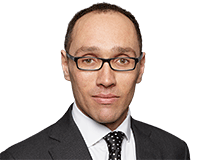 Is this London mayoral race an era-defining poll? Not on the basis of the performance of the two main candidates at this week’s LandAid Debate.
Is this London mayoral race an era-defining poll? Not on the basis of the performance of the two main candidates at this week’s LandAid Debate.
Firstly, congratulations to LandAid on convincing Zac Goldsmith and Sadiq Khan to take part (as well as the LibDem candidate Caroline Pidgeon and Darren Johnson, representing the Green Party). They have reputedly had 300 requests to share a platform and accepted only a fraction. It shows the seriousness of the issue that LandAid is now focused on tackling – youth homelessness – and the persuasiveness of everyone involved.
On the night at least, neither Goldsmith nor Khan convinced. Both had flashes of passion; Goldsmith in disagreeing with Khan on what he considered “affordable”, Khan on the calibre of his fellow supporters of staying in Europe.
Both mostly, and disappointingly, seemed only to feign disagreement on issues.
For both, housing is the number one policy priority. For both, building on the green belt is a no no. And for both, curbing overseas sales of off-plan flats is a must. For Khan this was evidenced by the mantra “first dibs for Londoners”. For Goldsmith it was a promise to extend the mayor’s concordant with developers on overseas sales. But it adds up to the same thing.
How about greater focus on using public sector land to deliver affordable homes? Yes, you can count on them both for that.
Other than Europe, where Khan is an “inner” and Goldsmith an “outer”, and on Tube fares, where Khan is promising a four-year freeze, there was little of substance between them.
I doubt that is really the case. What it suggests is that neither candidate has a firm grip on policy detail as it affects this sector. And that needs to change.
Judging by the loudness of the applause – and the depth of the gasps – in Westminster Central Hall, you won’t be surprised to hear that property appeared instinctively pro-Goldsmith. At least until the debate touched on Europe. Goldsmith backs Brexit; the room appeared to reject it. Will that cost him votes in May? Perhaps not, given our opportunity to vote on that issue just seven weeks later. But it adds weight to the argument that this mayoral election is less significant than other events on the horizon.
As the LandAid Debate was taking place in a Grade II listed building in SW1, across London in a former carpet factory in E1 there was another event that added further weight to that argument.
At Second Home, a workspace for entrepreneurs and creative businesses, it was standing room only for a talk on the industries of the future.
Alec Ross, senior adviser for innovation to Hillary Clinton, set out “the advances and stumbling blocks that will emerge in the next 10 years, and how we can navigate them”. From robotics to cybersecurity, the commercialisation of genomics to the next step for big data, he explained issues that may feel remote but will have a profound impact on technology, investment and markets. And, in one way or another, property.
I don’t think the mayoral candidates addressed any of those issues either.
More firmly on the mayor’s turf was Thursday’s second annual Estates Gazette/Peter Wilson lecture, which took place at Fitzwilliam College, Cambridge. It was delivered by Lord Kerslake – you’d know him better as Bob, former head of the Homes & Communities Agency and the Department for Communities and Local Government.
Now head of the London Housing Commission, which reports next month, Kerslake diagnosed the policy failures that have put us in this position of crisis (and, yes, he used the phrase “mea culpa”) and talked of potential solutions.
I would expect one of the mayoral candidates to brandish the report when it appears next month. Based on Tuesday night’s performance, it may well be both.










